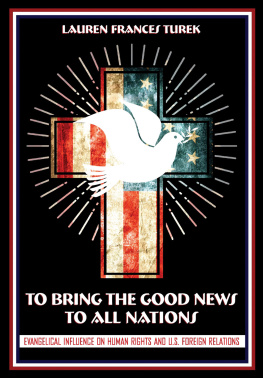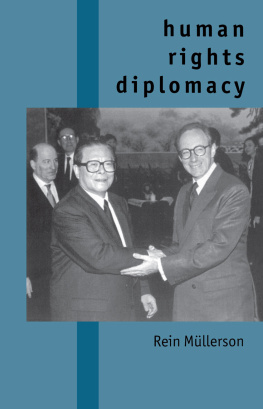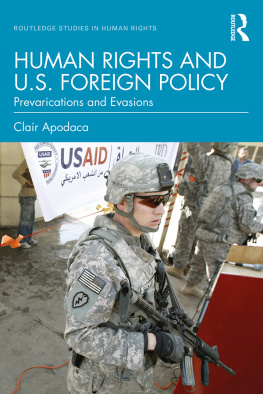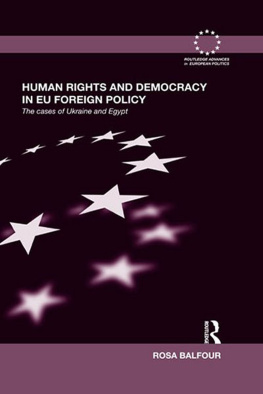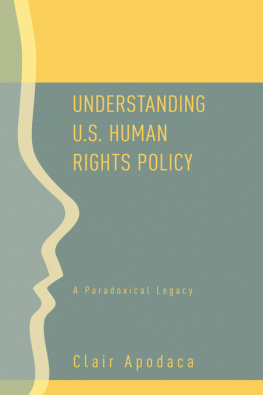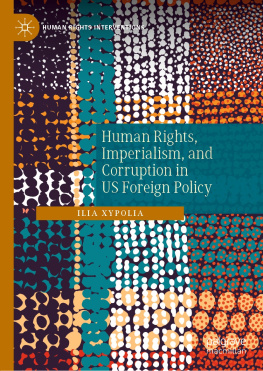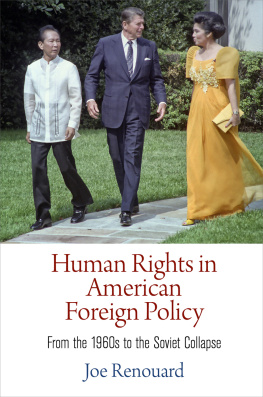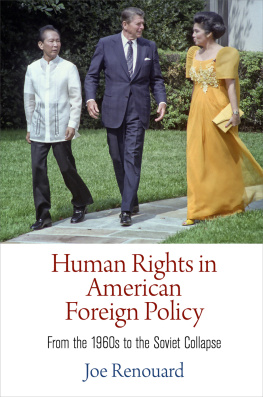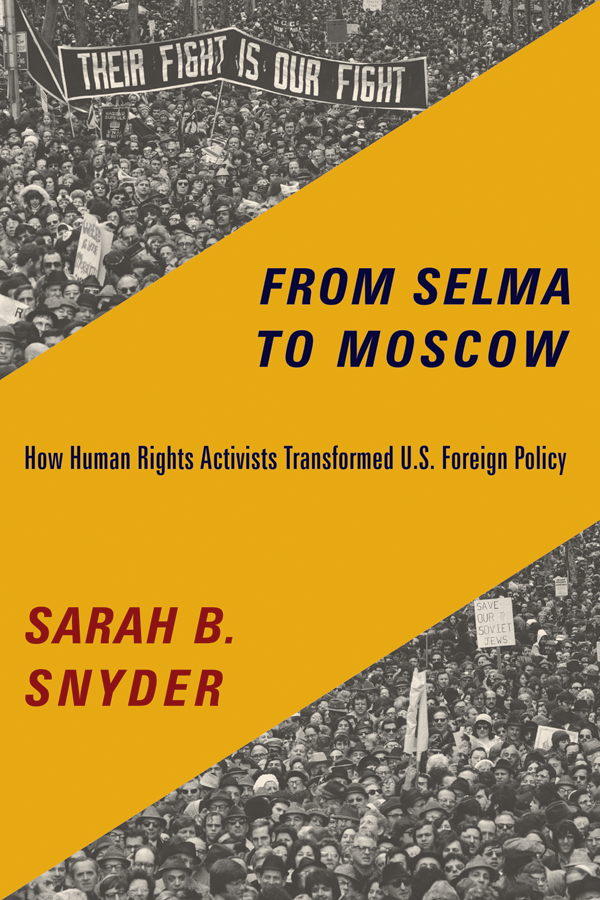Contents
Guide
Pagebreaks of the print version
FROM SELMA TO MOSCOW
From Selma to Moscow
HOW HUMAN RIGHTS ACTIVISTS TRANSFORMED U.S. FOREIGN POLICY

Sarah B. Snyder

Columbia University Press
New York
Columbia University Press
Publishers Since 1893
New YorkChichester, West Sussex
cup.columbia.edu
Copyright 2018 Columbia University Press
All rights reserved
E-ISBN 978-0-231-54721-5
Library of Congress Cataloging-in-Publication Data
Names: Snyder, Sarah B., 1977 author.
Title: From Selma to Moscow : how human rights activists transformed U.S. foreign policy / Sarah B. Snyder.
Description: New York : Columbia University Press, 2018. | Includes bibliographical references and index.
Identifiers: LCCN 2017032475 | ISBN 9780231169462 (cloth : alk. paper) | ISBN 9780231169479 (pbk : alk. paper)
Subjects: LCSH: United StatesForeign relations19451989Case studies. | Human rights advocacyCase studies.
Classification: LCC E840 .S595 2018 | DDC 327.73009/04dc23
LC record available at https://lccn.loc.gov/2017032475
A Columbia University Press E-book.
CUP would be pleased to hear about your reading experience with this e-book at .
Jacket image: Bettmann/Getty Images
Jacket design: Chang Jae Lee
In memory of
Abbott Gleason and Nancy Bernkopf Tucker
CONTENTS
Chapter One
Human Rights Activism Directed Across the Iron Curtain
Chapter Two
A Double Standard Abroad and at Home? Rhodesias Unilateral Declaration of Independence
Chapter Three
Causing Us Real Trouble: The 1967 Coup in Greece
Chapter Four
Does the United States Stand for Something? Human Rights in South Korea
Chapter Five
Translating Human Rights into the Language of Washington: American Activism in the Wake of the Coup in Chile
Chapter Six
A Call for U.S. Leadership: Congressional Activism on Human Rights
This project began in response to a question posed to me in 2008 by Mark Lawrence, who asked if I had done any research on human rights during the Johnson years. I hadnt. His question and his subsequent invitation to participate in a conference he organized with Francis Gavin, entitled Lyndon Johnson and the Beginnings of the PostCold War Era, sparked this project.
As the bibliography attests, the research for this book took me to several continents and to congressional collections and presidential libraries scattered across the United States. Numerous organizations offered essential financial support for the research that forms the basis for my analysis, including American University, University College London, Yale University, the Rockefeller Archive Center, the Gerald R. Ford Foundation, the Lyndon Baines Johnson Foundation, Friends of the Princeton University Library, the Kennedy Library Foundation, and the Eisenhower Foundation. My research travels were far more enjoyable when I had the opportunity to stay with friends and family, such as Allison Higgins; Kristin Hay and Paul Rubinson; J. P., Amy, William, and Evelyn Fine; Allison and Nader Akhnoukh; and Lindsey Leininger.
Over the years during which I have been working on this project, a number of colleagues and organizations have offered me opportunities to present my research and receive useful feedback. For these invitations I thank Jennifer Miller, Mitchell Lerner, Eirini Karamouzi, Simon Rofe, the Washington History Seminar, Ronald Granieri, Jussi Hahnimki, Georgetown Universitys International History Seminar, Steven Hewitt, Bevan Sewell, Mark Bradley, Kaeten Mistry, Kelly Shannon, Andrew Preston, Geoffrey Connor, Mark Lawrence, James Loeffler, Pierre-Olivier de Broux, Historians of the Twentieth Century United States, the Organization of American Historians, the American Historical Association, and (last, but certainly not least) the Society for Historians of American Foreign Relations. In addition, Effie Pedaliu, Mark Lawrence, Mark Bradley, Thomas Schwartz, Peter Kuznick, Barbara Keys, Jeremi Suri, David Luban, and Petra Goedde have all commented on sections of this book that were presented as conference papers. James Loeffler, Carl Watts, Brad Simpson, Daniel Sargent, Casey Bohlen, Tanya Harmer, Matthew Jones, and Scott Kaufman all shared with me or steered me toward useful sources.
I deeply appreciate the time that Craig Daigle, Meredith Oyen, Robert Rakove, Steven Jensen, Ryan Irwin, James Loeffler, Patrick Kelly, Paul Rubinson, Eirini Karamouzi, and Danny Fine spent reading chapters of the manuscript. The resulting book was also improved by the anonymous readers of Columbia University Press and by my editor there, Philip Leventhal, who pushed me to reframe my argument in bolder ways. In addition, Miriam Grossman helped facilitate the books production, and Abby Graves offered excellent copyediting. Most significant was a meeting in Washington in 2015 in which Elizabeth Borgwardt, Thomas Borstelmann, Mark Bradley, Mark Lawrence, Eric Lohr, Andrew Preston, and Alice Friend helped me work through a draft of this manuscript. Their suggestions sent me running in many directions, and the book benefited considerably from their careful readings.
Since I have arrived at American University, the School of International Service has supported my research in numerous ways, including by hosting a book incubator. Perhaps even more invaluable has been the funding the school provided for research assistance. Without the help of Alice Friend, Jaclyn Fox, and Luke Theuma, this book would have taken years longer to finish. Alice, in particular, devoted two years to sorting through arcane questions, demystifying the foreign military sales process, and making the charts for the manuscript that illustrate the New York Times growing attention to human rights.
Choosing a title is always a challenge, and I want to thank in particular Allison Higgins, Aaron OConnell, Andrew Fine, David Andersson, Brin Frazier, Julie Taylor, and Leila Adler for helping me think through different ideas.
The preceding are my professional debts, but my personal ones are similarly significant to me. In addition to my family, old and new friends made and maintained through two transatlantic moves have supported me through this book-writing process. I want to particularly thank Allison Higgins, Amy Sheridan, Larissa Moniz, Craig Daigle, Lien-Hang Nguyen, Becky Farbstein, Leonie Hannan, Adam Smith, Andrew Preston, Simon Rofe, Angela Romano, Emmanuel Mourlon-Droul, Vanessa Berberian (who shared my early interest in the 1960s), and most of all, my husband, Danny Finemy toughest critic and greatest supporter.
This book is dedicated to the memory of two people who had profound impacts on my life and careermy undergraduate adviser, Abbott Gleason, and my PhD supervisor, Nancy Bernkopf Tucker.
At a time of burgeoning interest in the history of global human rights politics, recent works have argued variously that Americans turned their attention to human rights as a result of Jimmy Carters 1976 election, guilt over the war in Vietnam, or failed political utopias. Taken together, this book shows that Americans were engaged with a wide range of human rights issues across the long 1960s. People who had transnational connectionsties to foreign people and places forged through travel or other border-crossing interactionsunited with other Americans who were motivated by broader international and domestic movements; the activism they produced ushered in the institutionalization of human rights in U.S. foreign policy and the expansion of human rights activism in the United States during the late 1970s, the 1980s, and beyond.


